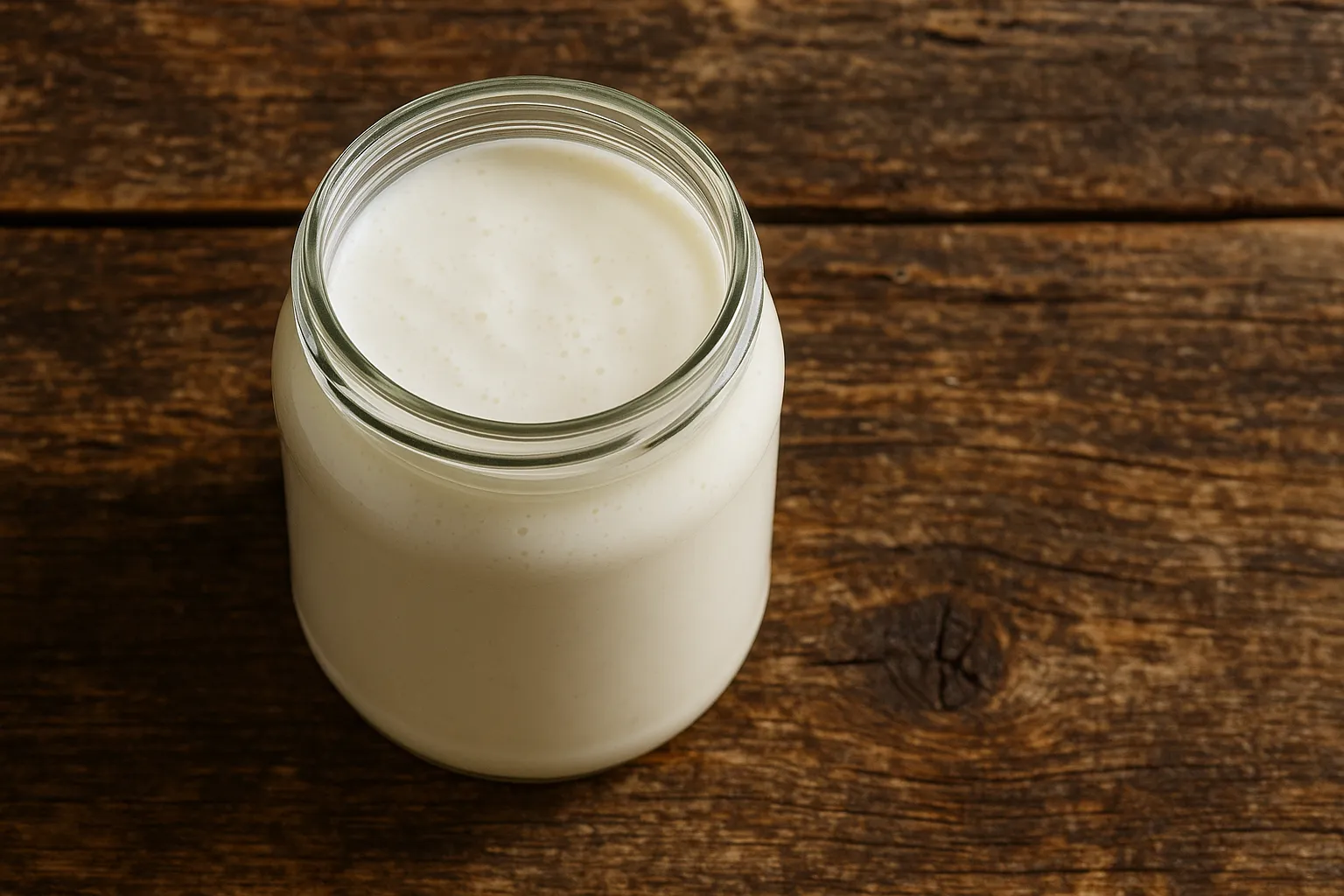Kefir: Calories, Nutrition and Probiotic Benefits
Fermented milk drink with 10-34 probiotic strains, superior gut health benefits, and better bacteria diversity than yogurt.
Quick Nutrition Facts
Per 100ml (Low-fat, Plain)
| Nutrient | Amount |
|---|---|
| Calories | 61 kcal |
| Protein | 3.5g |
| Carbohydrates | 4.8g |
| Sugars | 4.8g |
| Fat | 2.5g |
| Calcium | 120mg |
| Phosphorus | 95mg |
| Vitamin B12 | 0.3mcg |
| Sodium | 40mg |
| Probiotics | 10-34 strains |
Macronutrient Breakdown

NUTRITIONIST INSIGHT
Kefir's 10-34 probiotic strains far exceed yogurt's 2-7 strains. The fermentation reduces lactose by 80-90%, making it tolerable for most lactose-intolerant individuals. Drink 200ml daily for optimal gut health benefits.
Myth Busters
MYTH #1: Kefir Is Just Liquid Yogurt
TRUTH: Kefir contains 10-34 different bacterial strains plus beneficial yeasts, compared to yogurt's 2-7 bacterial strains. The bacterial count in kefir is also 3-5x higher, making it far superior for gut diversity.
MYTH #2: Lactose Intolerant People Can't Drink Kefir
TRUTH: Kefir's fermentation process reduces lactose by 80-90% and contains lactase enzyme that helps digest remaining lactose. Most lactose intolerant people can tolerate kefir without issues.
MYTH #3: All Kefir Products Are the Same
TRUTH: Traditional kefir made with live kefir grains contains 10-34 strains. Commercial kefir may use starter cultures with only 7-10 strains. Check labels for "live and active cultures" and strain count.
MYTH #4: Kefir Will Make You Gain Weight
TRUTH: Low-fat kefir has only 61 calories per 100ml. Studies show kefir may actually aid weight loss by improving gut bacteria diversity and reducing inflammation. The high protein (3.5g) also promotes satiety.
MYTH #5: Store-Bought Kefir Has No Benefits
TRUTH: While homemade kefir has more strain diversity, quality store-bought kefir still provides significant probiotic benefits. Look for brands with 10+ strains and no added sugars. Avoid ultra-pasteurized versions.
MYTH #6: You Need to Drink Liters of Kefir for Benefits
TRUTH: Research shows benefits with just 200-250ml daily. More isn't always better - excessive amounts may cause digestive discomfort. Consistency matters more than quantity.
NutriScore by Health Goals
| Health Goal | NutriScore | Why This Score? |
|---|---|---|
| Weight Loss |  | Low calorie (61/100ml), high protein promotes fullness, probiotics improve metabolism and fat storage regulation. |
| Muscle Gain |  | Moderate protein (7g per 200ml serving), easy-to-digest amino acids, calcium for muscle contraction. |
| Diabetes Management |  | Low glycemic index, probiotics improve insulin sensitivity, reduces inflammation. Choose plain, unsweetened kefir. |
| PCOS Management |  | Probiotics reduce chronic inflammation linked to PCOS, improves insulin resistance, supports hormonal balance. |
| Pregnancy Nutrition |  | Safe probiotic source for digestive health, 120mg calcium per 100ml, protein for fetal development. Choose pasteurized. |
| Viral/Flu Recovery |  | Probiotics boost immune system, easy to digest, provides fluids and electrolytes, B vitamins support energy recovery. |
PERSONALIZED NUTRITION
Track your meals with NutriScan for personalized NutriScores based on your specific health goals!
Blood Sugar Response to Kefir
Understanding how kefir affects your blood glucose can help optimize consumption timing and pairings.
Typical Glucose Response Curve
*This chart shows typical blood glucose response for general healthy individuals. Individual responses may vary. Not medical advice.*
How to Optimize Blood Sugar Impact
Kefir's probiotics and protein naturally slow glucose absorption, but you can further improve the response:
- 🌰 Add chia seeds or flaxseeds - Adds fiber and omega-3s
- 🥜 Mix with almond butter - Provides healthy fats and protein
- 🫐 Top with berries (not banana) - Low glycemic fruits with antioxidants
- 🌰 Sprinkle nuts (walnuts, almonds) - Slows absorption further
Avoid adding honey, maple syrup, or dried fruits which spike blood sugar. Plain kefir is best for blood sugar control.
Cultural Significance
Kefir originated in the Caucasus Mountains over 2,000 years ago, where it was considered a gift from the gods.
Historical Origins:
- Name derives from Turkish "keyif" meaning "good feeling" after drinking
- Kefir grains were closely guarded family treasures, passed down through generations
- Only became known to Western science in the early 1900s when Russian scientists studied Caucasian longevity
Traditional Uses:
- Russian and Eastern European staple for digestive health
- Traditional medicine for tuberculosis treatment in 19th century Russia
- Used in monasteries as a health tonic
Global Spread:
- Now consumed in 50+ countries with regional variations
- Western markets adopted kefir in the 2000s as probiotic awareness grew
- 2020s superfood trend drove 15-20% annual market growth in North America
Compare & Substitute
Kefir vs Similar Fermented Dairy (Per 100ml)
| Nutrient | 🥛 Kefir | 🥛 Greek Yogurt | 🥛 Regular Yogurt | 🥛 Buttermilk |
|---|---|---|---|---|
| Calories | 61 kcal | 59 kcal | 61 kcal | 40 kcal |
| Protein | 3.5g | 10g | 3.5g | 3.3g |
| Carbs | 4.8g | 3.6g | 4.7g | 4.8g |
| Fat | 2.5g | 0.4g (non-fat) | 3.3g | 0.9g |
| Calcium | 120mg | 110mg | 121mg | 116mg |
| Probiotics | 10-34 strains + yeasts | 2-7 strains | 2-4 strains | 1-2 strains |
| Lactose | Very low (fermented out) | Low | Moderate | Low |
| Best For | Gut diversity, lactose intolerant | High protein, weight loss | General health, calcium | Baking, low-calorie |
Frequently Asked Questions
Is kefir better than yogurt for probiotics?
Yes, kefir is significantly superior for probiotic diversity. Kefir contains 10-34 different bacterial and yeast strains, compared to yogurt's 2-7 bacterial strains only.
Key advantages: Higher bacterial count (colony-forming units); includes beneficial yeasts that colonize the gut; more diverse strain types for comprehensive gut health; thinner consistency allows easier consumption.
Best choice: Traditional kefir made with kefir grains; commercial kefir with 10+ listed strains; plain, unsweetened varieties.
Can lactose intolerant people drink kefir?
Most lactose intolerant people can tolerate kefir without issues. The fermentation process reduces lactose content by 80-90%, and kefir contains the lactase enzyme which helps digest remaining lactose.
Tips for lactose intolerance:
- Start with 50-100ml daily and gradually increase
- Choose longer-fermented kefir (24-48 hours has less lactose)
- Drink with meals initially
- Monitor your individual response
If severe lactose intolerance, try coconut or water kefir alternatives. Always consult your healthcare provider.
How much protein is in kefir?
Kefir contains 3.5g protein per 100ml. A standard 200ml serving provides 7g protein, comparable to regular milk.
While lower protein than Greek yogurt (10g/100ml), kefir's protein is highly bioavailable and comes with superior probiotic benefits. For muscle gain or high-protein needs, combine kefir with protein powder, nuts, or seeds.
What are the main health benefits of kefir?
Key Benefits:
- Superior Gut Health: 10-34 probiotic strains improve gut bacteria diversity
- Better Digestion: Enzymes and probiotics aid nutrient absorption
- Immune Support: 70% of immune system is in the gut; kefir strengthens it
- Bone Health: 120mg calcium per 100ml plus vitamin K2 for calcium absorption
- Weight Management: Probiotics regulate metabolism and reduce inflammation
- Lactose Tolerance: Helps digest dairy by providing lactase enzyme
- Mental Health: Gut-brain axis connection; probiotics may reduce anxiety
When is the best time to drink kefir?
Depends on your goal:
- Gut Health: Morning on empty stomach (probiotics colonize better)
- Weight Loss: As breakfast replacement or snack (200ml)
- Digestion: 30 minutes before meals (enzymes aid digestion)
- Sleep: Evening (contains tryptophan, calming effect)
- Post-Workout: Within 30 minutes (protein for recovery)
Avoid: Taking kefir with hot beverages or food (heat kills probiotics). Wait 30 minutes after hot drinks.
How much kefir should I drink daily?
General Guidelines:
- Beginners: Start with 100ml daily for 1 week (allow gut adjustment)
- Maintenance: 200-250ml daily (optimal for most studies)
- Therapeutic: 300-400ml daily (for specific health goals, short-term)
- Maximum: 500ml daily (more may cause digestive discomfort)
Adjustment Period: Some experience mild bloating, gas, or digestive changes for 3-7 days. This is normal as gut bacteria adjust. Reduce amount if symptoms persist beyond 2 weeks.
Track your kefir intake with NutriScan app to monitor effects on your health goals.
Does kefir have any side effects?
Possible Side Effects (usually mild and temporary):
- Digestive adjustment: Bloating, gas, loose stools for 3-7 days (normal)
- Histamine sensitivity: Some people react to fermented foods
- Overgrowth symptoms: Excessive amounts (>500ml) may cause issues
Who should be cautious:
- Immunocompromised individuals (consult doctor before consuming probiotics)
- Pregnant women (choose pasteurized kefir)
- Those with yeast overgrowth/SIBO (kefir contains yeasts)
- Histamine intolerance (fermented foods can trigger symptoms)
Safe approach: Start small (100ml), choose quality brands, listen to your body, consult healthcare provider if concerns.
Can I make kefir at home?
Yes, homemade kefir is easy and more probiotic-diverse than store-bought.
Basic Steps:
- Get kefir grains (online or from friends; reusable indefinitely)
- Mix: Add 1-2 tablespoons grains to 2 cups milk
- Ferment: Cover with cloth, room temperature 12-48 hours
- Strain: Remove grains, refrigerate kefir
- Repeat: Reuse grains immediately or store in fresh milk
Advantages: More strains (30+); lower cost; control fermentation time and flavor; no additives.
Tips: Longer fermentation = tangier flavor and less lactose; use whole milk for creamier texture; avoid metal utensils.
 ChatGPT
ChatGPT  Claude
Claude  AI Mode
AI Mode  Perplexity
Perplexity 



